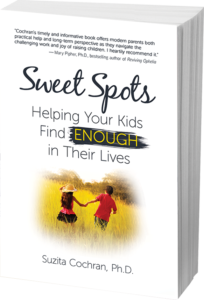 Ashley is an 11 year-old who lives in our neighborhood. She’s soft-spoken and curious. Her big brown eyes constantly take in the world around her. A while back I bumped into Ashley’s mother and we got to talking. I asked how Ashley’s transition to middle school had gone this year, since our son Daniel had been through a harder transition than I’d expected.
Ashley is an 11 year-old who lives in our neighborhood. She’s soft-spoken and curious. Her big brown eyes constantly take in the world around her. A while back I bumped into Ashley’s mother and we got to talking. I asked how Ashley’s transition to middle school had gone this year, since our son Daniel had been through a harder transition than I’d expected.
Middle School
Ashley’s mom said in elementary school her daughter had always had difficulty speaking up and never liked group projects, but had managed to show her other strengths. Ashley soon discovered, however, that middle school had even more group work and seven teachers to get to know rather than one. She’d been a good student in the past, but at conferences in middle school a number of teachers said they’d like Ashley to be more active in group work and talk more in class.
Ashley said she would try to improve on these areas. Yet her mom had noticed that as the year progressed, Ashley seemed to be enjoying school less even though she had good friends.
Introverts in an Extroverted World
Soon after this conversation with Ashley’s mom, I began reading Quiet: The Power of Introverts in a World that Can’t Stop Talking, by Susan Cain, and met many others like Ashley within its pages. Cain points out that we live in a country that reveres extroverts. This stance has become more extreme in recent generations. As Ashley has found, and my kids will attest, group work is widespread in today’s public schools.
Cooperative learning favors extroverts who like to think through problems aloud rather than gathering their thoughts prior to offering them, as introverts do. Yet today’s teachers are told they must prepare students for the working world where teamwork is the norm.
Cain lists additional research showing that working in groups is not always the best context for creativity. Introverts do their best work alone, at least for a good portion of their working day. Studies have also shown that organizations that don’t allow employees to close the door to distractions are less productive than those which do – for both introverted and extroverted types.
Skills of Introverts
Cain also highlights the strengths of introverts. They tend to have fewer interests, but pursue them more deeply over longer periods of time. This goes for friendships as well. Introverts notice their environment more accurately and are sensitive to changes around them, often catching problems in a project more quickly than others. Their sensitivity to people and environments, and lack of focus on wealth and fame, often makes them more effective leaders than extroverts. Introverts enjoy taking in large and varied amounts of information, and excel at synthesizing and strategizing.
When I spoke to Ashley’s mom, she told me that Creative Writing was Ashley’s favorite class and mentioned that her daughter brought a fairly mature understanding of the happenings around her into her writing. Her writing teacher noticed too.
Extroverted Schools
Like many introverted children, however, Ashley was feeling that school wasn’t a place where she could regularly draw on her strengths. Instead she often got the message that she needed to learn to be an extrovert. Granted, the skills of extroverts are important in life, but so are those of introverts. If we are teaching introverted kids to be more extroverted, why are we not helping extroverted kids learn the strengths of introverts in school?
Introverts and Modern Technology
Upon finishing Quiet, I picked up Sherry Turkle’s book, Alone Together: Why We Expect More From Technology and Less From Each Other. Turkle, an anthropologist and psychologist, has studied the effects of technology on today’s young people and our culture in general. She worries that teens who are constantly online or texting, are not “cultivating the ability to be alone and reflect on one’s emotions in private.” Young people who consistently look outward to their social networks, aren’t learning the skill that comes naturally to many introverts like Ashley, self-reflection.
Having interviewed numerous teens and adults throughout America about the role of technology in their lives, Turkle concludes:
A stream of messages makes it impossible to find moments of solitude, time when other people are showing us neither dependency nor affection. In solitude we don’t reject the world but have the space to think our own thoughts. But if your phone is always with you, seeking solitude can look suspiciously like hiding [to those contacting you].
I haven’t quite finished reading Alone Together, but after reading 3/4ths through, it occurred to me that perhaps Susan Cain’s introverts have an extra layer of protection against the allures of modern technology – their natural comfort with solitude. And they have another leg up due to their tendency toward introspection.
New Perspectives
I’ve always thought of myself as more of an extrovert, and two out of three of my kids are definitely extroverts. Yet reading Quiet reminded me that each of us has a unique mix of introverted and extroverted traits. Quiet helped me appreciate my introverted qualities, those of my neighbor Ashley, and my older son Stephen. The book even encouraged me to further develop some introversion characteristics that I don’t have in excess.
I think I’ll make a cup of tea, sit down in a quiet spot, and finish reading Alone Together.
How do your introverted kids handle school? Leave a comment!

 Sweet Spots: Helping Your Kids Find ENOUGH in Their Lives.
Sweet Spots: Helping Your Kids Find ENOUGH in Their Lives.


I am a talkative introvert who has a reserved introverted daughter. Your comments really rang true about the preferences given to extroverted learning styles.
Thanks for your comment, Krista!
I am not sure if one of my girls is an introvert or just shy and not social confident, but either way, school is definitely geared towards those who are more extroverted.
I knew that our society pushed being ‘popular’ as a goal to be attained but had never realised how much education also does.
Loved your post on this topic.
I am an extrovert with an introverted child. I seek advice from my neighbor (an introvert) when I find myself worrying about my introverted child. He needs his “down” time, and is okay with playing with a child that seeks him out, but rarely initiates a social meeting. I often call him a “home body”. He is content to just be home with us – and later on, if this changes, I may find myself missing this. As far as school goes, teachers describe my introverted child as “reserved” and one recently said, “I’m glad to hear that he is so happy with his new school, because it is hard to tell what he is thinking.” However, teachers almost always get to know him better by the end of the year, because he is just slow to “warm up.” I think of it this way: he likes to listen, and take in his surroundings and people’s personalities, before his comfort level allows him to speak up. Thanks for an article that I can definitely relate to. p.s. As your article mentioned, while introverted, my son’s teachers also state that he demonstrates leadership skills when working with a group.
I read Quiet last year and thought it was good too. When I was done I handed it off to one of the introverts I love, but I think it’s very helpful for everyone. And as you said, most of us have both introverted and extroverted qualities and it’s great to respect and nurture those different sides of ourselves and others.
You’ll might like Daniel Pink’s book, To Sell is Human, which talks about “ambiverts”. He asserts that we are all mostly ambiverts, somewhat in the middle of introvert and extrovert.
I have a very introverted daughter, too who has ADHD so she gets lost in a crowded classroom. Private school with smaller classes helps but it’s still a challenge to help her be accepted by teachers who value participation.
He comes home exhausted! It’s gotten better as he’s gotten older but I definitely need to make sure he has plenty of time to unwind or do quiet activities on his own every night. Reading is a huge help and we get in my big bed and read together almost every night. If he has to miss for some reason he’s pretty bummed so it must be relaxing for him. I also try not to pack his schedule (easier said than done) because I know how I feel (I’m an introvert) with no down time!